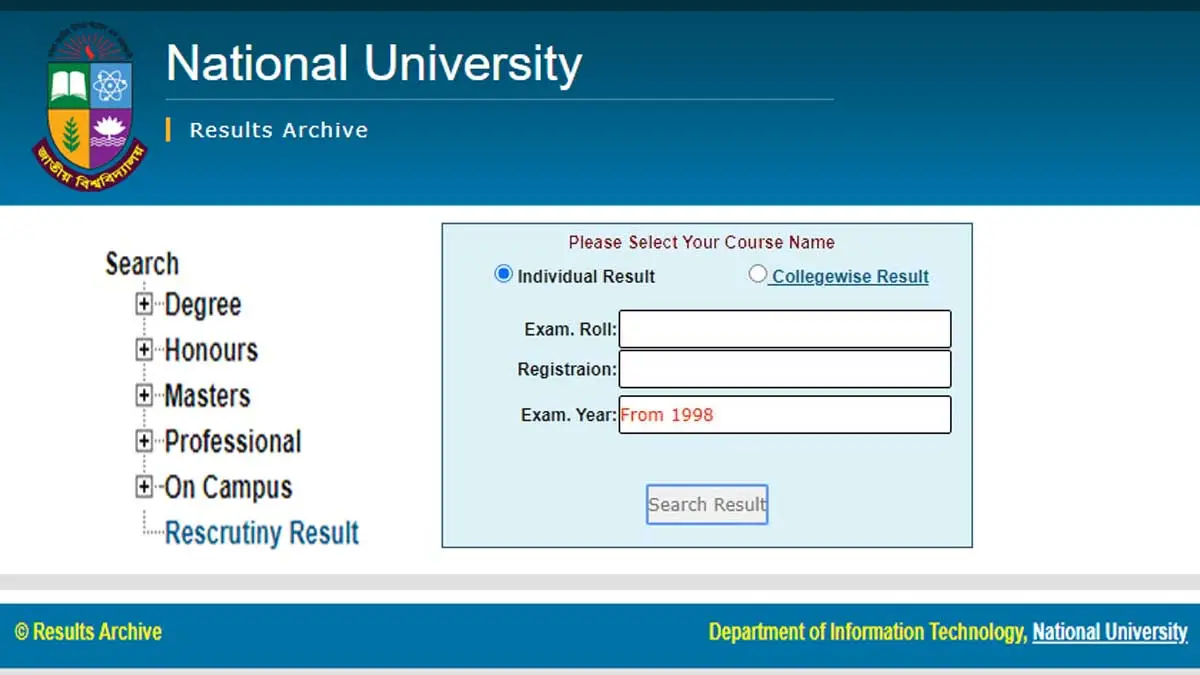The Degree 3rd Year result marks a pivotal moment for students completing their undergraduate studies in various disciplines. Serving as the culmination of three years of hard work and dedication, this result not only reflects a student’s academic progress but also plays a crucial role in shaping future opportunities, whether for higher studies or professional careers. With the growing accessibility of online result-checking systems, students can now easily track their performance. Understanding the result process, grading system, and post-result steps is essential, as it helps students make informed decisions about revaluation, further studies, and career paths following this significant milestone.
What is the Degree 3rd Year?
The Degree 3rd Year typically represents the final academic year for undergraduate programs in various disciplines such as Arts, Science, and Commerce. This year is crucial as it determines the students’ overall academic performance and readiness for either higher education or entering the workforce.
Importance of Degree 3rd Year Results
Degree 3rd Year results are significant because they reflect the cumulative performance of a student’s academic journey. The results often serve as a key factor in eligibility for postgraduate programs, professional courses, and job opportunities. High scores can also open doors to scholarships and further educational benefits.
How to Check Degree 3rd Year Results Online
Steps for Checking Results on Official Website
- Visit the official examination results website.
- Select “Degree 3rd Year Results” from the available options.
- Enter your roll number, date of birth, or other required credentials.
- Submit the information to view your results.
- Download and save a copy of the result for future reference.
Alternative Ways to Check Results
Besides the official website, some universities provide results through SMS services or mobile apps. To check via SMS, follow the format provided by the university, typically involving sending your roll number to a specific number.

Grading System
Overview of Common Grading Scales
Universities often use grading scales such as percentage, GPA, or letter grades. Understanding the grading scale is essential, as it impacts your overall academic profile and eligibility for further education.
Percentage to Grade Conversion
Many institutions use a conversion scale like:
- 90-100%: A+ or Distinction
- 80-89%: A
- 70-79%: B
- 60-69%: C
- Below 50%: Pass/Fail
Important Dates for Degree 3rd Year Results
Expected Release Timeline
Degree 3rd Year results are usually released within two to three months after the final examinations. Always check the official academic calendar for precise dates.
Official Announcements
Stay updated on official announcements through the university website, bulletin boards, or social media channels to avoid missing any important notifications.
What to Do After the Results Are Out
Steps for Revaluation
If you believe there has been an error in your results, apply for revaluation. Follow the instructions on the website, submit the required fee, and wait for the reevaluation results.
Reappearing for Improvement
For those who wish to improve their scores, many universities offer reexaminations. Confirm eligibility and application dates with your university.
Degree 3rd Year Result Revaluation Process
Application Process
To apply for revaluation, fill out the application form on the official portal, upload any necessary documents, and pay the fee.
Fees and Timelines
Revaluation fees vary based on the university. Typically, revaluation applications are accepted within a specific time window, often one to two weeks after results are published.
How to Interpret Your Result Scorecard
Key Sections of the Scorecard
The scorecard usually includes personal details, subject-wise grades, overall GPA, and remarks. Understanding each section helps you identify areas of strength and improvement.
Understanding Remarks and Comments
Remarks such as “Pass,” “Distinction,” or “Eligible for Improvement” provide insights into your performance. If there are additional comments, they may indicate if any issues need addressing.
How to calculate Final CGPA Result?
To calculate your final CGPA (Cumulative Grade Point Average) result, follow these steps:
- Identify the Grade Points for Each Subject: Note the grade points earned in each subject for each semester. Grade points are typically based on the grades achieved (e.g., A = 4, B = 3).
- Multiply Each Grade Point by the Subject Credit: Each subject has a specific credit (weight) assigned. Multiply the grade point by the credit for each subject.
- Example: If you scored a grade worth 4 points in a 3-credit subject, the calculation is ( 4 \times 3 = 12 ).
- Add the Weighted Grade Points for All Subjects: Sum the weighted grade points for all subjects across all semesters.
- Add the Total Credits: Sum up all the credits for the subjects you’ve taken.
- Divide the Total Weighted Grade Points by Total Credits: Calculate your CGPA by dividing the total weighted grade points by the total credits.
- Formula:

Example Calculation
Suppose you have taken four subjects with the following details:
| Subject | Grade Point | Credit | Weighted Grade Points (Grade Point × Credit) |
|---|---|---|---|
| Subject 1 | 3.5 | 4 | 14 |
| Subject 2 | 4.0 | 3 | 12 |
| Subject 3 | 3.0 | 3 | 9 |
| Subject 4 | 3.7 | 2 | 7.4 |
- Total Weighted Grade Points = 14 + 12 + 9 + 7.4 = 42.4
- Total Credits = 4 + 3 + 3 + 2 = 12
So,

This would be your final CGPA.
Next Steps: Applying for Higher Studies
Requirements for Further Education
Your Degree 3rd Year score often determines eligibility for postgraduate courses. Be aware of cut-off percentages or specific grade requirements for programs of interest.
Popular Courses After Degree 3rd Year
Students often pursue postgraduate degrees like a Master’s in their field, MBA, or specialized diploma courses to gain advanced knowledge and improve job prospects.
Tips for Students Awaiting Results
Managing Anxiety
Stay positive and try relaxation techniques like meditation to manage stress. Focusing on self-improvement or hobbies can also help.
Staying Updated with Official News
Keep track of updates through the official university website or social media to stay informed about result announcements and related information.
Conclusion
Degree 3rd Year result is more than just a score; it’s a significant milestone that influences a student’s future academic and career path. Whether students plan to pursue higher studies, seek employment, or enhance their skills, the results provide a foundation for informed decision-making. It’s essential to stay updated with official announcements, understand revaluation options, and be aware of next steps to make the transition smoother. As students move forward, staying proactive and positive can open doors to exciting opportunities, ensuring that this achievement becomes a stepping stone toward their long-term goals and aspirations.
Final Advice for Students
Stay calm, focused, and proactive as you await your results. Be sure to double-check any official announcements and understand your options, so you can confidently move forward with your next steps.
Frequently Asked Questions
When will the Degree 3rd Year results be declared?
Degree 3rd Year results are generally announced within two to three months after final exams are completed. Each university has its own timeline, so it’s important to keep track of official announcements from your university’s examination board or website. Most universities also share these dates on their social media channels and through SMS alerts if you’re registered with them. Be sure to check regularly, as the exact date can sometimes shift.
How can I check my Degree 3rd Year result online?
To check your result online, visit your university’s official examination results portal. Look for a link specifically for “Degree 3rd Year Results” or similar. Enter your roll number, registration number, and any additional details required, like your date of birth, and click “Submit” or “View Result.” If successful, your result will display on the screen, which you can then download or print. Always verify the URL to ensure you’re on the official site to avoid phishing attempts.
What should I do if I forget my login credentials?
If you forget your login details, most result portals provide a “Forgot Password” or “Forgot Roll Number” option. Follow the instructions, which usually involve entering your registered email or phone number to receive a reset link or instructions. If this option is unavailable, contact your university’s exam office through their helpline, email, or in person. Be ready with other identification details (like your student ID) to verify your identity and recover your account information.
Can I apply for revaluation if I’m not satisfied with my result?
Yes, if you believe there was an error in the evaluation, you can apply for revaluation. Typically, you’ll need to submit a revaluation application form through your university’s portal, upload relevant documents (like your result card), and pay a revaluation fee, which varies by subject and institution. Make sure to apply within the designated time window, often within one to two weeks after results are declared, as late applications are usually not accepted. After revaluation, the revised result will be updated in your academic record.
What is the grading scale for Degree 3rd Year results?
Universities use different grading systems. Some use percentages, while others use letter grades or GPA (Grade Point Average). Here’s a common scale example:
- 90-100%: A+ (Distinction)
- 80-89%: A (Excellent)
- 70-79%: B (Good)
- 60-69%: C (Average)
- Below 50%: Pass/Fail, depending on specific university standards. Your grade can impact eligibility for postgraduate studies or specific career opportunities, so it’s important to understand how it reflects your performance.
What should I do if my result says ‘Result Not Found’?
If you encounter this message, it may indicate that your result is still being processed or there was a minor technical issue. First, confirm that you entered your credentials correctly. If the problem persists, wait a day or two and check again. If it’s still unresolved, reach out to the university’s exam department to verify if there’s a delay for your batch or any issue specific to your record.
Can I apply for improvement exams if my scores are low?
Yes, many universities offer an improvement exam option for students who wish to increase their scores in certain subjects. Improvement exams typically take place in the next exam cycle. You’ll need to check your university’s policy, as some allow improvements for any subject, while others limit this to core subjects only. Complete the improvement application, pay any associated fees, and prepare for the exams, as they can be pivotal in enhancing your final grade.

